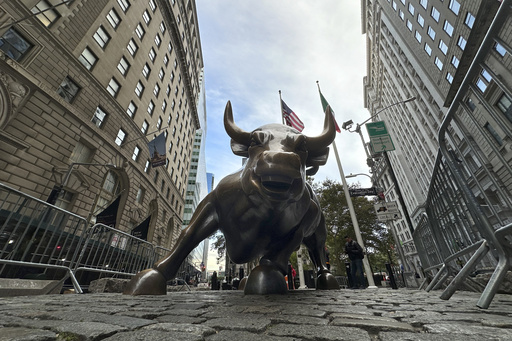
BANGKOK — Asian markets faced a predominantly downward trend on Wednesday following a downturn in U.S. stocks, which declined from their record highs due to sell-offs in the technology and energy sectors.
The Nikkei 225 index in Tokyo dropped by 1.8%, closing at 39,210.61. This decline was primarily driven by a warning from Dutch chip equipment manufacturer ASML about a lag in semiconductor demand outside of the AI sector boom. Notably, Tokyo Electron’s stock fell by 9.8%, while Lasertec Corp., which specializes in chip inspection equipment, saw a significant drop of 13.4%.
In Australia, the S&P/ASX 200 index decreased by 0.2% to 8,301.80. Seoul’s Kospi index fell by 0.4% to 2,622.27. Meanwhile, Taiwan’s Taiex index nudged down 0.5%, and India’s Sensex experienced a slight loss of 0.2%. Conversely, shares in China generally surged, rebounding from previous losses. The Hang Seng index in Hong Kong rose by 0.9% to 20,501.77, and the Shanghai Composite gained 0.4% to reach 3,214.01.
On Wall Street, the prior day saw stocks retreat from their records, with the S&P 500 index dipping 0.8% to 5,815.26, just one day after hitting an all-time high, marking its 46th peak this year. The Dow Jones Industrial Average also fell by 0.8% to 42,740.42, while the Nasdaq composite declined by 1% to finish at 18,315.59.
Exxon Mobil’s stock decreased by 3%, contributing to significant losses in energy shares as oil prices dropped more than 4%. Brent crude oil, the global benchmark, fell below $75, down from over $80 just a week earlier.
The decline in crude prices is attributed to concerns regarding China’s slowing economic growth impacting oil demand. Additionally, fears of an Israeli strike on Iranian oil facilities have diminished, lessening concerns about disruptions to Iran’s substantial crude exports.
However, oil prices showed some recovery in morning trading on Wednesday, with U.S. benchmark crude rising by 29 cents to $70.86 per barrel, while Brent crude climbed 26 cents to $74.51 per barrel.
Nvidia significantly impacted the S&P 500 with a 4.5% drop in its share price. However, the chip manufacturer’s stock has surged 166.2% this year due to the excitement surrounding AI technology profitability.
ASML’s latest quarterly report indicated ongoing opportunities in AI, yet CEO Christophe Fouquet noted that recovery in other markets is lagging. Consequently, ASML’s stock traded in the U.S. fell by 16.3%.
Concerns have also risen regarding potential new U.S. restrictions on chip exports targeting companies like Nvidia and AMD, as stated by Anderson Alves of ActivTrades. Investors are closely monitoring Taiwan Semiconductor Manufacturing Corp.’s earnings report expected on Thursday, leading to a 1.9% drop in TSMC’s shares on Wednesday.
In a positive development, U.S. chipmaker Wolfspeed saw its stock surge by 21.3% on Tuesday after the Biden administration announced plans for up to $750 million in funding for the company’s new silicon carbide facility in North Carolina.
Charles Schwab’s stock climbed by 6.1% due to a rise in brokerage account openings, bringing total client assets to a record $9.92 trillion. Meanwhile, Bank of America experienced a slight increase of 0.5%, with CEO Brian Moynihan attributing this to higher average loans and investment banking fees.
Walgreens Boots Alliance also reported gains, increasing by 15.8% after exceeding analysts’ expectations, although it announced plans to close approximately 1,200 locations over the next three years to revitalize its struggling U.S. operations.
In the bond market, Treasury trading resumed after a holiday, with yields declining in response to unexpectedly weak manufacturing data from New York state. The yield on the 10-year Treasury note fell to 4.03% from 4.10%.
As of early Wednesday, the dollar was trading at 149.19 Japanese yen, slightly down from 149.22 yen. The euro also slipped to $1.0890 from $1.0892.
